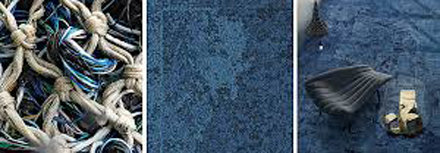
Did your carpet start life as a fishing net? If so, it’s a great example of one part of the circular economy. Here’s more.
Robb Donzé is a carpetmaker with a difference. Managing director of New Zealand sustainable interiors company Inzide Commercial, Donzé is a stockist and ardent promoter of Interface’s Net Effect carpet. The carpet is made from old fishing nets, due to a partnership called Net-Works, between Interface and conservation charity the Zoological Society of London.
Under the Net-Works initiative, discarded fishing nets are collected and sold to yarn supplier Aquafil, which repurposes the fishing nets into yarn. This yarn is used in Interface’s Net Effect recycled-content nylon carpet tiles.

It’s all part of a strategy which sees Donzé’s 2020 goals for his business being a zero ecological footprint, zero waste, and selling products that are either 100% biodegradable or 100% closed loop recycled.
The latter won’t be easy. Imagine your average carpet. Bought, shipped, installed for one purchaser, if could well be passed (along with the house it is attached to) to several different owners before needing to be scrapped.
The chance that the final owner won’t know where the original carpet came from – or be bothered to find out, even if the carpet producer is prepared to have the product back to make it into something else.
Donzé wants to change that.
“Closed-loop manufacturing is about turning that line [from raw material to manufacturer to consumer to rubbish tip] into a loop. Whatever you take out of the ground and turn into a product needs to be turned into another product, rather than discarded,” says Robb.
Consumers like the products partly because of the story behind them.
The issues around the circular economy is one area that Robb Donzé will be covering at the Sustainable Business Network’s Project NZ 2014 conference in Auckland next week.
Another hot topic is “reverse logistics”, Donzé says – the pathway for manufacturers to get product back from the consumer, rather than just to them.
“The current logistics system has been developed to get products where they need to go as quickly as possible. However, right now it costs more to get our carpet tiles back to Auckland at the end of their life than it does to send them to the States for recycling,” says Robb.
“Here in NZ, freight and courier systems are set up to get products to the point of sale ASAP without any incentive to get them to the recyclers afterwards.”
Want to hear more about the circular economy and how you can apply these principles to your business? Robb Donzé is one of several speakers on this and other topics at the Project NZ: SBN 2014 Conference to be held at AUT Business School in Auckland from 17-18 September.




